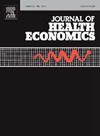同伴抑郁遗传易感性对自身心理健康的影响。
IF 3.6
2区 经济学
Q1 ECONOMICS
引用次数: 0
摘要
本文利用国家青少年到成人健康纵向研究(Add health)的数据,研究同龄人抑郁的遗传易感性如何影响青少年和成年早期的心理健康。我研究了不同学校和不同年级的同性毕业生的多基因平均得分——一种遗传变异的线性指数——对重度抑郁症(MDD)的得分的差异。同龄人患抑郁症的遗传风险增加会对自己的心理健康产生直接的负面影响。同性毕业生的平均重度抑郁症得分每增加一个标准差,青春期女孩(增加7.2%)和男孩(增加25%)患抑郁症的概率就会分别显著增加1.9和3.8个百分点。这种影响会持续到女性成年,而不是男性。我探索了这种影响背后的几个潜在机制,发现同龄人在青春期患抑郁症的遗传风险增加会使友谊恶化,增加物质使用,并导致社会经济地位降低。这些影响对女性比对男性更强烈。总的来说,结果表明,在心理健康的背景下,有重要的社会遗传效应。本文章由计算机程序翻译,如有差异,请以英文原文为准。
The effect of peers’ genetic predisposition to depression on own mental health
This paper studies how peers’ genetic predisposition to depression affects own mental health during adolescence and early adulthood using data from the National Longitudinal Study of Adolescent to Adult Health (Add Health). I exploit variation within schools and across grades in same-gender grademates’ average polygenic score—a linear index of genetic variants—for major depressive disorder (the MDD score). An increase in peers’ genetic risk for depression has immediate negative impacts on own mental health. A one standard deviation increase in same-gender grademates’ average MDD score significantly increases the probability of being depressed by 1.9 and 3.8 percentage points for adolescent girls (a 7.2% increase) and boys (a 25% increase), respectively. The effects persist into adulthood for females, but not males. I explore several potential mechanisms underlying the effects and find that an increase in peers’ genetic risk for depression in adolescence worsens friendship, increases substance use, and leads to lower socioeconomic status. These effects are stronger for females than males. Overall, the results suggest that there are important social-genetic effects in the context of mental health.
求助全文
通过发布文献求助,成功后即可免费获取论文全文。
去求助
来源期刊

Journal of Health Economics
医学-卫生保健
CiteScore
6.10
自引率
2.90%
发文量
96
审稿时长
49 days
期刊介绍:
This journal seeks articles related to the economics of health and medical care. Its scope will include the following topics:
Production and supply of health services;
Demand and utilization of health services;
Financing of health services;
Determinants of health, including investments in health and risky health behaviors;
Economic consequences of ill-health;
Behavioral models of demanders, suppliers and other health care agencies;
Evaluation of policy interventions that yield economic insights;
Efficiency and distributional aspects of health policy;
and such other topics as the Editors may deem appropriate.
 求助内容:
求助内容: 应助结果提醒方式:
应助结果提醒方式:


